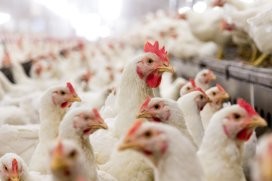Aviagen looks at European slower growing broiler market

Insights over demand for slower growing broilers across Europe has shown a complex market with a range of cultural drivers.
Aviagen’s Rowan Range business manager in Europe Claudio Ambrogio has spent the past year visiting colleagues and customers across Europe to get a deeper understanding of the slower growing markets in each country and region of the Continent.
In an in-house interview, Mr Ambrogio said the main lesson learned was that the landscape of slower-growing birds varied greatly across Europe.
“The region as a whole is complex in its diversity so there is no one-size-fits-all approach. It’s very interesting to see the differences in market drivers. Some markets in the European landscape are motivated by a strong sense of culture and family tradition, while in others public perception and the welfare aspect of slower-growing, coloured, free range and organic birds is further developed and more deeply embedded.
“And then you’ll see other regions where retailers simply look to slower-growing products as a means of differentiation or the consumer is driving demand through increased spending power. All in all, Europe has a diverse group of cultures, all at different stages in the slower-growing evolution and all with distinct priorities and market drivers.”
Mr Ambrogio said the Rowan Range offered excellent welfare characteristics for the slower-growing market, adding that it had been approved by a number of European welfare accreditation schemes such as RSPCA Assured in the UK, Tierschtzlabel in Germany and Beter Leven in the Netherlands.
He added that the most mature market for the slower growing bird was in Holland: “It has the potential to set the pace for other regions in Europe. Also very important to Aviagen is the ability to continue to develop our Rowan Range portfolio into the future; insight from the Dutch industry is therefore invaluable.”
The EU Broiler Ask and its Better Chicken Commitment is calling for companies and suppliers to adopt breeds that demonstrate higher welfare outcomes including various Hubbard and Ranger breeds by 2026. This week it announced that Azzurri had become the first restaurant group in Europe to make the commitment.
Increasing numbers of companies are pledging to source broilers raised according to Global Animal Partnership standards, making pledges to source only slower-growing broiler breeds raised to GAP and RSPCA standards.
GAP is aiming to replace 100% of chicken breeds that result in poor welfare outcomes by 2024 with breeds meeting specific welfare outcomes within its 5 Step Rating Programme
Join 31,000+ subscribers
Subscribe to our newsletter to stay updated about all the need-to-know content in the poultry sector, three times a week. Beheer
Beheer











 WP Admin
WP Admin  Bewerk bericht
Bewerk bericht